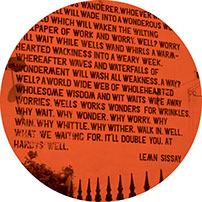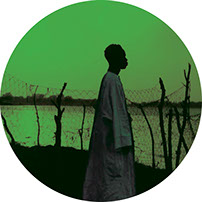N O T E S F R O M T H E S O U T H
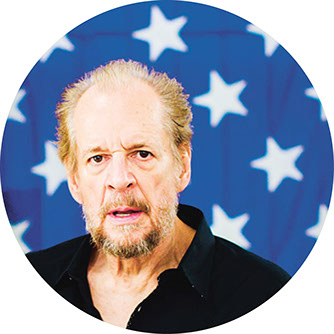 For Real
For Real
I spoke to artist and filmmaker Larry Clark, the directorial force behind the controversial and emotionally honest film Ken Park
Larry Clark spent the ’70s and ’80s in a stupor of drugs and alcohol, all the while documenting the disintegrating margins of the world around him, most famously in Tulsa, his series of photographic essays on the teenage sub-cultures that populated the eponymous middle-American town in Oklahoma.
Now Clark is sober and one of the world’s most cutting-edge film-makers, having achieved equal parts reverence and virulent criticism for Kids, his portrayal of the secret world of a bunch of young adolescents moving around New York City. It was a gritty but beautifully shot slice of what some would come to call pornography.
With Ken Park, almost in direct response to those critics and complainers, there are no holds barred. The film is a portrait of the sexual life of a quartet of teenagers in a small Californian town, complete with vaginas, erections, threesomes, actual ejaculations and the not-always-welcome presence of adults. It leaves nothing to the imagination, providing none of the false romanticisations of the sexual act that cinema has made us so used to.
But for those who will insist that it is pornography, I’m going to provide a very simple rule of thumb to separate art from porn. And it is this: that you stop looking at pornography after orgasm. With art the gaze continues. The graphic imagery in Clark’s films, while it might be salacious – going where the non-moral eye actually wants to go – is miles away from pornography. It is too honest, too real, too uncomfortable, too ultimately untitillating.
In his films and his photography, Clark has always portrayed an uncompromised vision of the world, particularly when it comes to sex and sexual personality. He has never been afraid of what is, for some, the subconscious netherworld of sex and all its genitalia. And it’s precisely because of this lack of fear that he can afford to be so uncompromisingly, unflinchingly honest. In recognising the base realness in the pelvis that runs all the way up the spine to the brain, Clark grants us a broader, more visceral humanity, adding the pieces of the jigsaw that few others in Western culture are prepared to.
Peter Machen: In Ken Park, for the first time in one of your films we see the substantial presence of adults, of grown-ups. Was this in any way an attempt to create causal links for the ways in which the kids in your other films behave?
Larry Clark: Well, the first film, Kids, was just about the kids’ secret world where adults weren’t allowed at all. And everyone said “Where are the parents?” And I always said, “Wait until Ken Park”. This was actually the set of stories that I wanted to tell, that I thought would be my first film. Ken Park is essentially the film that moves me into making film.
I started out as a documentary photographer and I’ve always been a storyteller. And these were stories I wanted to tell, but that I couldn’t just go out and document – I couldn’t go out and just be there when these things happened. So that’s what moved me into making films, and it just took a long time to get this film made.

PM: You talk about the concept of the documentary. How much of the film is also autobiographical, an expression of yourself?
LC: Well, in a way a lot of it is, in that it’s about people who I’ve known. Two of the stories in the film are based on stories of friends of mine. So they’re actually based on a couple of people that I know – real people. And the other two stories are composites of newspaper articles and people I’ve seen on television, on talks shows, talking about their lives.
So all the stories come from real life, and I think that all these things happen, and have happened in every society, every country. And they’ll probably happen again and keep happening. It’s a part of life and these are stories that just don’t get told often. But stories that I thought that were important to tell. As I say, this could well have been my first film.
PM: Despite the cultural differences, I grew up in a place where events were not that dissimilar to Ken Park. And I think a lot of people do, regardless of whether they want to acknowledge it or not. But that kind of truth is always ignored and made unreal. Why do you think that people seem not to be able to cope with actual sexuality and a graphic portrayal of it?
LC: (laughs) That’s the 64 000 dollar question … (pauses) … You know I think people can deal with it. I think that audiences are underestimated. I mean, when I see the response to this film, most of the responses, and I’m not exaggerating, most of the responses have been so positive. People have really appreciated the film and thought that it was a good film. You know, we were dealing with real-life situations that were kind of important to tell, at least once in a while. I think that with society, with all the rules that are put up about what one can see and what one can’t see, there’s this preconceived thinking that people can’t see things like this, and I don’t think it’s true.
Plus, this is a special film. It’s really well done. I’ve been making images all my life, for over 40 years. And I’m really comfortable with making images. And so I think it’s just a culmination of all my experience, all my work, you know, to do something really accomplished. I look at the film and I see it, in my body of work, as a very mature work. I think it’s very accomplished. And maybe that’s it; maybe it’s just well done.
PM: And brave. Maybe not for you, but within broader society.
LC: I guess it is, I guess it is brave, yeah. But you know, I didn’t start out as a film-maker. I didn’t start out in that world. I’ve always been an artist. And the role of the artist is different. It’s about breaking new ground. It’s about not having a set of rules and not thinking in a set way. You don’t think about what you can and can’t do. It just doesn’t come up. If you had showed these images in an art gallery, nobody would have blinked. But when you’re making a film for such a large audience, maybe it is thought of as brave. But for me, it’s just that these were the stories I always wanted to tell, and I needed to be visually honest and emotionally honest. So many times you see films that just aren’t visually honest because people just simply don’t realise that you can be.
After the film was finished, I thought to myself, “Film-makers are going to see this film and say, ‘gee I didn’t know you could do that’.’’ Because people are so programmed that they think with making films that there are things you can do and things you can’t do. And it just doesn’t come up for me. That said, I am realistic. I knew that there would probably be problems with distribution. But that’s just business.
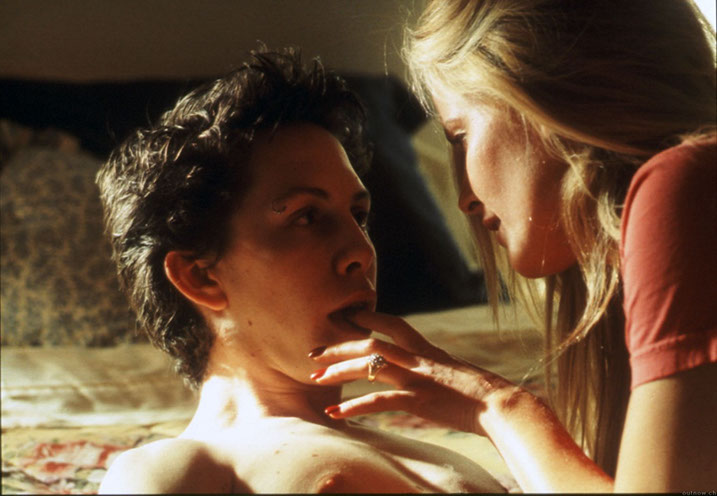
PM: How do you feel about the effective censorship your films have experienced?
LC: Its almost ‘knee-jerk’ – the fact that these are things you can’t do. But I think audiences have been so underestimated, as I said earlier. I don’t think anyone’s been damaged by seeing this film. And people are responding to it, and I think this kind of blanket censorship certainly doesn’t apply to this film. The danger is that by breaking new ground – which I’ve done in my work for a long time – is that you’re going to get a lot of people trying to work without all the boundaries and the work’s not going to be so good. It does open it up to some crummy work.
PM: On a more personal note, are you still living quite a wild life, or are you focusing most of your energy into film-making, or are you managing to do both?
LC: No, I’m very calm now. I’m not the wild man I used to be. At all.
PM: Do you think that wildness has been purged through your art?
LC: No, I had a lot of things that I had to get past. I had drug addiction and alcoholism and all that kind of stuff, and I’m luckily still alive. I have a lot of gratitude that I’m still here, and healthy and happy, and working.
The last three films I’ve made, I’ve been completely clean, no drugs of any kind. And I think the work shows that. I think the work’s better, and clearer. I’m really one of the luckiest people in the world, to have made it through all that shit.
PM: Do you think that in the end you can get addicted to sobriety as its own high?
LC: Absolutely, absolutely. I’m certainly not missing anything. And I’m probably happier than I’ve ever been in my life. I’m very happy now.
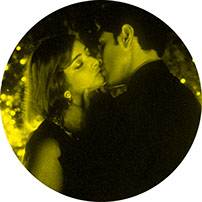
More
Film
© 2017 Peter Machen. All rights reserved About Contact Peter Machen Web design: The Communication Factory

